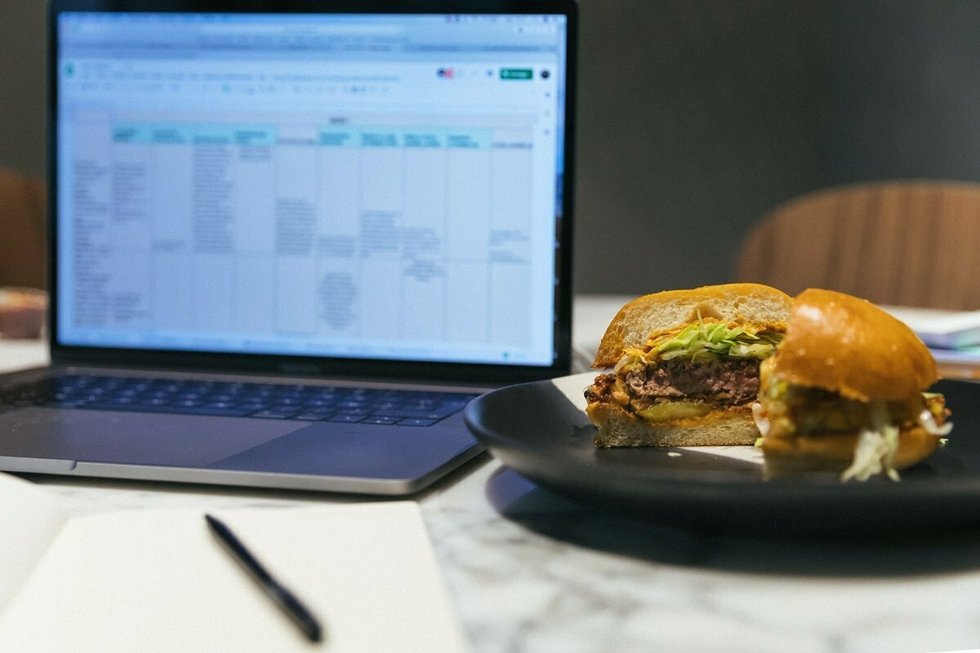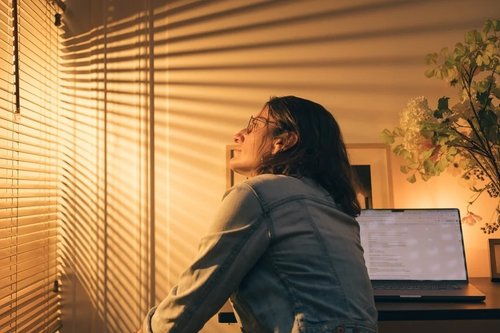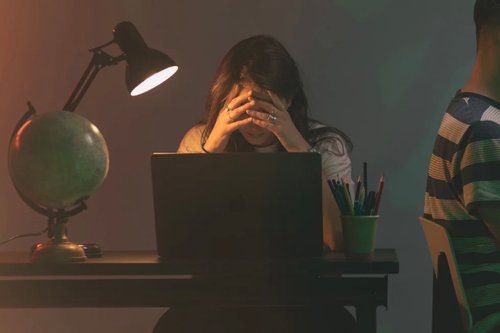How working from home affected my eating disorder
20 avr. 2021
6min


Journalist
“It’s almost like the second that lockdown happened, the control it took away from me led me to then have to control something else. And the only thing I could control was my eating.”
For Sarah Hull*, the director of a PR company, food has become a source of tremendous stress and an outlet for complicated feelings brought on by the health crisis. Many others have experienced similar problems. UK charity Beat, which helps those with eating disorders, has reported a 175% increase in demand for its services since the first lockdown. At the same time, working from home has been positive for others. We hear from three people whose relationship with food has changed—for better or for worse—since the pandemic began.
The Covid-19 crisis has affected many people with mental health issues, including eating disorders. Studies show that stress and negative emotions are associated with eating disorders, as are going through extreme life changes such as job transitions—all of which have been signature features of the past 12 months.
It is estimated that there are 1.25 million people living with an eating disorder in the UK. Even those who are considered to have recovered may continue to have difficult feelings around food and exercise for years to come, says Helena Lewis-Smith, a senior research fellow at the Centre for Appearance Research at the University of the West of England. “The difference is they’re not receiving treatment for it,” she said.
The impact of the pandemic is significant: people in all stages of the illness and recovery have seen their coping strategies stripped away. “Maybe they coped because they ate lunch with their office workers or they coped because they went to the gym,” said Lewis-Smith. “But they didn’t realize how much they relied on those things that they took for granted every day.”
Balancing control and food anxiety
Many of those with eating disorders use control and routine to help them to cope. Hull, 29, says the lockdown meant her work routine became chaotic, which felt deeply uncomfortable for a self-described control freak. Lewis-Smith explains that Hull’s discomfort is common among those with such disorders. “Control is such an important aspect of eating disorders,” she said. “A lot of people have found that, in lockdown, the control has gone.”
Hull developed negative eating habits during the first lockdown while she was on furlough and didn’t have the challenge of running her own company to keep herself busy. Now she feels that working from home means she is unable to do things to the best of her ability, and her food anxiety has persisted. “I’ll get to lunchtime and everyone says, ‘Right, we’re gonna sign off for lunch now,’ and I’ll just sit there thinking, ‘Should I eat lunch?’ I don’t know. I’ve got no one there telling me, ‘Yes, you should have lunch,’ and it ends up being a battle with myself,” said Hull.
For Adam Fare, a data analyst and transport planner, keeping a sense of control around food is a double-edged sword. Fare, 24, is in recovery for atypical anorexia nervosa, which bears many typical features of the illness but does not include low body weight. Part of his coping mechanism is meal planning to make sure he eats regularly.
Going to work used to be a feat of organization. “It used to be reams and reams of planning,” he said. As well as preparing food for the day—which he would then carry around with him—he would also plan his schedule “to the minute” to make sure he could find somewhere he felt comfortable enough to eat. Worries about unexpected changes, such as train delays, would keep him up at night. “The plan shouldn’t be so rigid that it causes anxiety and panic, but it does with me,” he said.
The social aspect
Lunch, birthday cakes, after-work nibbles: at work, food is often a conduit for social contact. Eating together is a way to get to know colleagues, but it can be a struggle for anyone with an eating disorder.
Christina Taylor is a life insurance underwriter in her thirties. She had developed anorexia nervosa as a teenager, but recovered six years ago with the help of therapy and family support. Eating with colleagues is still not something she enjoys. “I literally can’t think of anything that would make me feel more uncomfortable,” she said. “I’d probably rather sit among my team in a bikini.” This initially earned her a reputation as someone rude and unfriendly.
As Taylor became more comfortable with her eating disorder she began talking to her colleagues about it. She even started a blog and has become a vocal advocate for mental health in the workplace. Her employers have been understanding too. When she was ill, she was able to set her work hours around childcare and avoid lunch at work. If she did spend lunchtime at the office, it would be with trusted colleagues doing something like going for a walk. “They understood that eating was not a fun thing for me,” she said.
Fare has also been open about his eating disorder with his employer, who made sure his schedule was flexible so as to help him. Eating in the office can be difficult, especially when colleagues make comments. “If you bring a chocolate bar in, which is for me a huge, huge challenge and a big positive, then colleagues say, ‘Oh, I couldn’t eat that, that’s so bad,’” he said. His solution was to eat lunch later when the break room was quiet. “You can’t have that social time and you miss out on quite a lot, but it was the only way I could manage,” he said.
Home: a safe space for eating and wellbeing
Working from home has also brought Fare some relief. “I can just go to the fridge and get myself a snack—it makes life so much less stressful.” However, his work and eating schedules have come into conflict due to virtual meetings. “I’ve got to work out times I can go and make a meal, bring it back and eat it, probably while I’m in a meeting with myself on mute. Luckily, we don’t have our cameras on.” If the cameras were on, he would miss meals rather than eat in front of his colleagues.
For Taylor, working from home has meant an easier relationship with food. “I’ve been much happier. It’s been really nice to know that I can just sit down and eat when I want and however I want, and no one’s going to be looking at me,” she said. She describes home as a “safe place” where she can take a break with her cats or go for a walk when she feels stressed. This has bolstered her overall sense of well-being. “It’s a safer environment for me to do that,” she said. “I’ve set myself more challenges to do things like have fast food with my family that I wouldn’t ever have wanted to do before.”
A return to lunch in the office
If she has the choice, Taylor will continue to work from home. For Fare and Hull, the thought of returning to the office brings mixed emotions.
Fare lives alone and is looking forward to seeing his colleagues, but he’s worried about a return to meal planning. “Because I haven’t done it for so long, the anxiety is going to be even worse,” he said. Even so, he sees a return to the office as key to his recovery because it will get him out of his comfort zone. Before the lockdown, he was trying to eat one meal a week that he didn’t prepare at home. “If you’re working in an office, all you do is say, ‘I’m not taking my lunch in today’, then you’ve got no choice,” he said.
Hull also sees returning to work as a pathway back to health, even if she feels anxious about changing her eating habits. The office is a place where she feels comfortable eating and she would often eat with her team. “Everyone would be talking and I was able to consume food almost without being aware of it,” she said. “I think once normality comes back again there are so many other things that I can control and be in charge of, that’s just going to make me feel better and less focused on food.”
How to cope
For people who have struggled with eating and exercise during the pandemic, Lewis-Smith has the following advice:
- Practice self-compassion. “Everybody around the world is struggling, and it’s a very triggering time,” she said. “So be kind to yourself.”
- Speak to people you trust. “Tell them what you’re going through because then they can be supportive and mindful.”
- Take time off social media. If you have to be on social media, “be mindful of who you’re following. Follow more body positivity and self-compassion-based profiles.”
- Reach out to doctors and charities for support. “Don’t feel like you’re not worthy of it. A lot of people have felt that they can’t get help while other people have Covid. No! You are just as important.”
Hull agrees that kindness is key. She has kept her struggle with food a secret, but suspects people know from her obvious weight loss. She hopes that when she decides to open up, her struggle will be met with understanding after such a mentally challenging time for everyone. “When we all return to normality, having that awareness that not everyone is going to be okay is so important,” she said. “Now is the time to check in on friends, family, and colleagues and just be there.”
- If you or someone you know is affected by an eating disorder, the charity Beat has a helpline and web chat service available.
*Name has been changed.
Photo: Welcome to the Jungle
Follow Welcome to the Jungle on Facebook, LinkedIn, and Instagram, and subscribe to our newsletter to get our latest articles every day!

Inspirez-vous davantage sur : Bien-être psychique

Harnessing emotional intelligence at work: Turning feelings into strengths
Emotional at work? Instead of shutting down your feelings, try making them work for you ...
15 avr. 2024

What is psychological safety and why does it matter?
Discover how psychological safety boosts innovation and teamwork, and learn to cultivate a culture where every voice is valued.
13 mars 2024

Stress at work is contagious … Try not to catch it
Unfortunately, a face mask won’t protect you from stress, but here’s what will.
15 févr. 2024

How to get things done in a crisis
We aren’t just living in times of crisis – we’re living in times of back-to-back crises. Yet, we also live in a productivity-focused world...
04 janv. 2024

How to make the most of a bad performance review
Performance reviews can be stressful at the best of times, but what happens when you receive negative feedback?
06 déc. 2023
La newsletter qui fait le taf
Envie de ne louper aucun de nos articles ? Une fois par semaine, des histoires, des jobs et des conseils dans votre boite mail.

Vous êtes à la recherche d’une nouvelle opportunité ?
Plus de 200 000 candidats ont trouvé un emploi sur Welcome to the Jungle.
Explorer les jobs